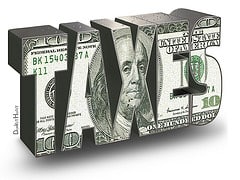
If you are struggling to pay the bills each month yet find yourself falling farther and farther in debt, bankruptcy may be the best long-term solution. Most individual debtors file either a chapter 13 or a chapter 7 bankruptcy. If you have significant tax debts, the way those debts are handled in the different bankruptcy chapters may play a role in determining which chapter you file. Despite what many people are led to believe, discharging tax debts through bankruptcy is not always possible.
Taxes and Chapter 7 Bankruptcy
In a chapter 7 bankruptcy most of your debts are discharged without having to repay them. For this reason, a debtor is required to qualify to file chapter 7 bankruptcy by passing the “means test”. The means test compares your income to the median income for similarly situated households in your area. If your income is below the median you may file a chapter 7 bankruptcy. Some tax debts can be discharged in a chapter 7 bankruptcy; however, there are very strict requirements that apply before a tax debt can be discharged, including:
- The debt is for income taxes.
- You did not commit fraud or willful evasion.
- The return was due at least three years ago.
- The return was filed at least two years ago.
- The debt was assessed at least 240 days ago or has yet to be assessed.
Even if your tax debt meets all of the above requirements it will not qualify for discharge if the debt has been reduced to a tax lien against your property. Although your personal obligation to repay the debt is, in theory, eliminated through chapter 7 bankruptcy, the lien against your property cannot be removed. In practical terms, this means that the debt will have to be repaid when you sell, refinance, or otherwise transfer the property.
Taxes and Chapter 13 Bankruptcy
In a chapter 13 bankruptcy the debtor is required to repay the majority of his or her debts by creating a repayment plan that is approved by the court. The repayment plan allows the debtor an extended period of time, typically three to five years, to repay debts. Debts in a chapter 13 bankruptcy are categorized as “Priority”, “Secured”, or “Unsecured” debts. With rare exceptions based on undue hardship, which is extremely difficult to prove, priority debts must be paid in full during the repayment plan. A few examples of tax debts that are considered priority debts include:
- Tax liens – if a tax debt becomes a lien against your property it becomes a priority debt even if it was originally a non-priority debt.
- Recent property taxes – payable within the preceding year.
- Withholding and sales tax – taxes you collect for employees such as Medicare, income taxes, and FICA.
Tax debts that are not considered priority debts will likely not be paid in full through your chapter 13 bankruptcy; however, a portion of the debt will be paid back according to the plan approved by the court. As a general rule, if your tax debt meets the chapter 7 requirements for discharge, it will be considered an unsecured non-priority debt in your chapter 13 bankruptcy. Typically, any non-priority tax debts that remain after successful completion of your repayment plan are discharged.
As you can see, there are numerous variables that go into determining how a tax debt is handled in bankruptcy. The only way to be certain your tax debt can be discharged through bankruptcy is to consult with a bankruptcy attorney. Call Diana Revzin at The Law Offices of Stephen B. Kass P.C. for help today.
Photo Credit: DonkeyHotey cc









